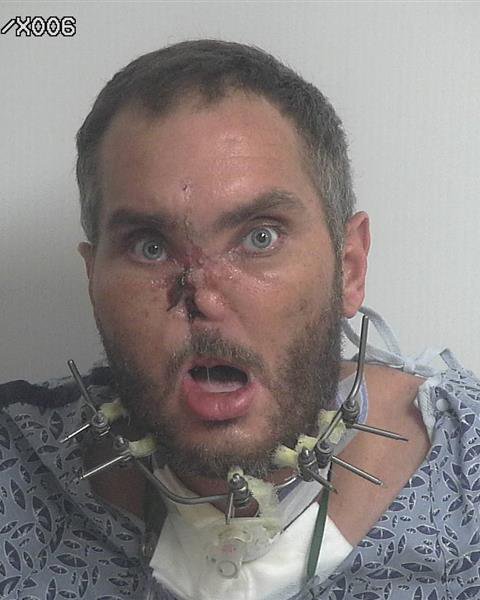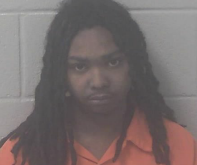MONROE, Ga. - On the morning of April 18, Lt. Tom Wilcox was pulling out of his Social Circle residence, heading toward Monroe, where he worked courthouse security for the Walton County Sheriff’s Office.
But, being a deputy, he would still respond to calls when he happened to be nearby. That morning, a call came across the line about a shooting on Knox Chapel Road.
Wilcox was the nearest officer. He headed to the address.
He arrived just ahead of Social Circle police officers Chad Hunt and Glen Thomas. Wilcox would later testify in court, through tears, what he and Hunt found as they approached the house.
“I saw a girl on the front porch, talking to 911 on a cell phone. Then I entered the home and saw a boy over his mother’s body, begging her not to die,” Wilcox said.
“I’ve been doing this a long time, but this was one of worst things I’ve seen.”
He and Hunt took stock of the scene. There was the bloody body of a woman on the floor of the living room, the victim of a “very obvious” gunshot wound. She was not breathing.
There were two spent shotgun shells on the floor. There was blood on the walls. The window on the side door had been busted in. There was pistol on the floor near the bedroom door.
Thomas ushered the children, who had blood all over their hands and clothes, to his car, where he got their names, Gannon and Gentrie Mobley, ages 8 and 9.
The woman on the floor was Katie Mobley, their mother. And very soon after other law enforcement arrived at the scene, they had a suspect: Katie’s ex-husband and Gentrie and Gannon’s father, Jerome Mobley.
What began that morning ended on Wednesday, as a jury found Jerome Mobley guilty of murdering Katie. Alcovy Judicial Circuit Chief Judge John Ott then sentenced Mobley to life in prison without the possibility of parole, plus 75 years.
The story unfolded over two and a half days, with the state, led by District Attorney Layla Zon and Assistant District Attorney Dave Williamson, presenting a litany of crime scene experts, reams of text messages between Katie and Jerome, videos of interviews with the Mobley children, and recorded 911 calls.
The defense, headed by Public Defender Anthony Carter, called just one witness: Jerome Mobley himself.
Just about all of the evidence pointed in a single direction. The jury found Mobley guilty after just 18 minutes of deliberation.
A rocky history
The story the prosecution told didn’t start on April 18. It began on Jan. 18, with a 911 call.
Katie and Jerome had been married for 10 years before they separated in July 2017. They had met, Jerome said, when he helped her change a tire.
But the relationship had soured, and Jerome had become abusive, as he, himself, admitted. Katie moved out of their place in Monroe, and moved between her parent’s house in Milledge¬ville and friends’ places in the Walton County area. She eventually landed in Social Circle, at a house on Knox Chapel Road.
The couple was informally sharing custody of the children, when, on Jan. 16, 2018, Jerome came to that house around 1 a.m.
As Brittany Freeman, a Walton County 911 dispatcher, testified, she returned a hang-up call that night to find Katie Mobley on the other line.
Katie said Jerome had forced his way into the house and taken the kids to his truck. Now he was standing in the front yard, smoking a cigarette, holding some jumper cables, and peering through the windows.
“He’s scaring me very bad,” Katie told Freeman.
“… He threatened me over the phone earlier. … He said he was going to haunt me my whole life.”
Freeman asked if he had been abusive in the past.
“Yes,” Katie said softly.
By the time deputies arrived, Jerome had sent Gentrie inside to get his grandfather’s pistol, which he testified was only because he wanted to get it back and leave Katie.
When Deputies Jonathan Hall and Michael Bailey pulled into the driveway, Jerome leapt into his truck and took off across the neighbor’s yard.
Hall and Bailey pursued and eventually boxed Jerome in. They arrested him at gunpoint, as Gannon shouted, “Don’t hurt my daddy!”
Jerome was charged with making terroristic threats, eluding officers and cruelty to children for his actions that night.
His bond was set at $13,000, which he met. As a condition of his bond, however, he was told not to have any sort of contact with Katie and the children, or go anywhere near their house.
He ignored those commands. As pages of text and Facebook messages between the two showed, Jerome repeatedly reached out to Katie. He begged her to let him see the kids. He never threatened her in the messages, but Katie was scared.
“Please don’t kill me,” she said once.
“I just know you’re going to kill me,” she said another time.
She saved him in her phone as “Anti-Christ.” He listed her as “The B----.”
Both tried to modify conditions of the bond. He hired a lawyer to help him win partial custody of the kids.
She went to the district attorney’s office to ask that his bond be revoked. Chief Magistrate Judge Mike Burke again emphasized the no-contact order, but did not rescind the bond.
That wasn’t enough, as it turned out.
Waking to shots
As she later told a forensic interviewer at A Child’s Voice Advocacy Center, Gentrie woke up on the morning of April 18 to the sound of gunshots.
She woke up Gannon, and they hid behind the door to their bedroom together.
“It smelled like fireworks,” Gannon would later say.
“It sounded like fireworks, too.”
After a few moments, the pair came out of their room to see their mother stumbling across the living room, holding her stomach, and their father holding a shotgun running for the door.
“I yelled ‘Stop, stop’ but I couldn’t stop him,” Gannon said.
He recognized the gun. He’d even shot it before, and said it kicked a lot.
“It was a 12-gauge,” he said.
“I saw it while he was walking out. I saw it today. … It has a picture of a cowboy on it.”
The kids rushed to their mother’s side after she fell.
“Call 911 right now,” Katie managed to gasp.
Gentrie grabbed the phone and dialed. Gannon crouched over his mother.
“I tried to keep her breathing. I was pumping her heart. I was doing everything I could to keep her breathing,” the 8-year-old said.
Meanwhile, Gentrie called 911.
“My daddy just broke in and shot my mommy,” she told dispatcher Sabrina McElroy.
As for where her father was, Gentrie said he’d taken off in a blue truck she’d never seen before.
Wilcox, Hunt and Thomas arrived moments later.
At the trial, Walton County Sheriff’s Office Investigator Mike Sellers reconstructed what he believed happened that morning.
Jerome, it appeared, had broken in through the side door of the house by knocking in the glass windowpane and unlocking it.
Katie must have awoken to the sound, because she found her pistol, a .38-caliber, six-shot weapon.
There were two doors to her bedroom, both leading to the living room. Sellers found an unbroken cluster of shotgun pellets in the wall behind the nearest door to where Jerome entered. He had shot at her and missed.
Sellers also found a small hole in that bedroom door, which Katie seemed to shoot through, probably hitting Jerome in the leg.
Three other bullets from the pistol were found in the living room carpet, along with holes in the wall. Another was found in the ceiling. The final bullet in Katie’s pistol misfired, and was still in the gun when Sellers found it.
But the final shot appeared to happen in the bedroom, as Jerome entered from the other door and, according to Georgia Bureau of Investigation Medical Examiner John Wassum, shot Katie in the right shoulder from less than an inch away.
She staggered out of the room, collapsed against the living room wall and fell to a final rest in front of the fireplace.
Jerome fled the scene in an old blue pickup truck, which was found later that day in Studdard Cemetery by Walton County Sheriff’s Deputy Keith Knight. A bloody belt and empty pack of Marlboros were found nearby, evidence he was wounded.
But he wasn’t found until April 20.
Brantley Wommack and his grandmother were grilling steaks in the backyard of their Hestertown Road home that afternoon.
The dogs were acting skittish, Brantley said, and he happened to look up and see someone in the field behind the house.
Brantley ran inside and woke up his dad, Mark, who was taking a nap. Mark grabbed his pistol and pair walked toward the field.
“It was very uncharacteristic for me to grab the gun,” Mark testified.
“But I’d heard about the search for Jerome Mobley.”
Incidentally, Mark knew Jerome, having done business with his father years ago.
When Mark and Brantley reached the field, Mark shouted, “Jerome!”
Immediately, they heard a gunshot go off. They ducked, but then saw someone stumble out from behind a tree about 25 yards away, his face awash with blood.
The man, Mark said, then started to take his clothes off, tearing his shirt and boots and unbuckling his pants.
“By this point, I was 99.9 percent sure I knew who it was,” Mark said.
Law enforcement arrived quickly. Walton County Sheriff’s Office Investigator Henry Huff examined the scene.
It didn’t take him long to find a 12-gauge shotgun loaded with live rounds behind a nearby tree.
It had an engraving of a cowboy on the stock.
On trial
Months later, Jerome took the stand at his own trial. His face had been surgically reconstructed. He breathed primarily through a trachea tube in his neck. He said he could only eat by feeding tube. To speak, he pressed a finger over the hole in his neck.

Under questioning from Carter, he claimed he went over to Katie’s house that April morning to try to reason with her into letting him see his kids, whom he hadn’t seen in four months.
He knocked on the front door he said, and Katie answered. An argument ensued.
“Get out of my house,” he said Katie told him.
“I’m not leaving until I see my kids,” he claimed he responded.
At some point, Jerome said, Katie fled into her room and shot him through the door.
“Then I went to my blue truck and I got in the seat and I don’t remember much more than that.”
Carter asked if he remembered shooting Katie.
“I didn’t know she was dead until four weeks later,” Jerome wheezed.
“I didn’t believe it.”
Zon eviscerated his story of forgetfulness during cross-examination.
“It’s just a coincidence that she said over and over that you were going to kill her and lo and behold you killed her?” she asked.
Jerome balked, the courtroom silent.
“I take your silence for an answer,” Zon said.
“You weren’t supposed to be there on April 18,” she said later.
“You went there to catch her by surprise. You didn’t call or text. You didn’t see if it was convenient … and you want everyone to believe this woman just let you into her house?”
“And why didn’t you call 911 when she shot you? An innocent person doesn’t hide in the woods for two days.”
“You’re a liar and a coward,” Zon said.
The jury agreed, pronouncing him guilty of malice murder, felony murder, aggravated assault, two counts of cruelty to children in the first degree, aggravated stalking, burglary in the first degree and possession of a firearm in the commission of a felony.
When it came time for sentencing, Ott had a few things to say first.
“You’ve got such a malignant and twisted heart,” he thundered.
“Your soul is so twisted and blackened. When you look in the mirror, what you see is your soul.”
He went on.
“You’re probably one of the most despicable human beings I’ve seen flow through this court,” Ott, who has been a judge since 1990, said.
Katie’s father, Joey, had earlier addressed Ott, begging him to impose the maximum sentence. Then he turned to face Jerome.
“I hope you look in the mirror every day and you remember what you did to her and those babies and you live with it,” he said.





